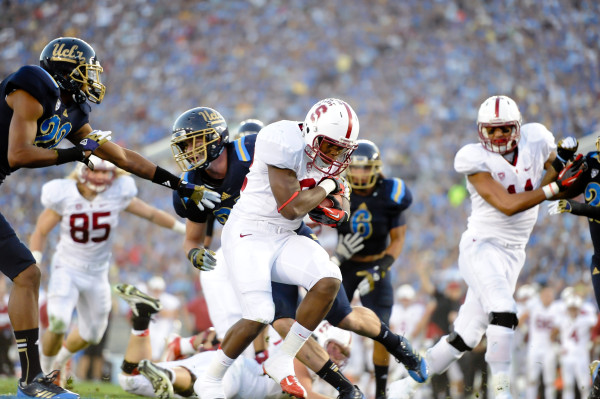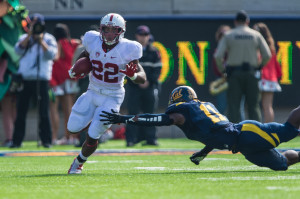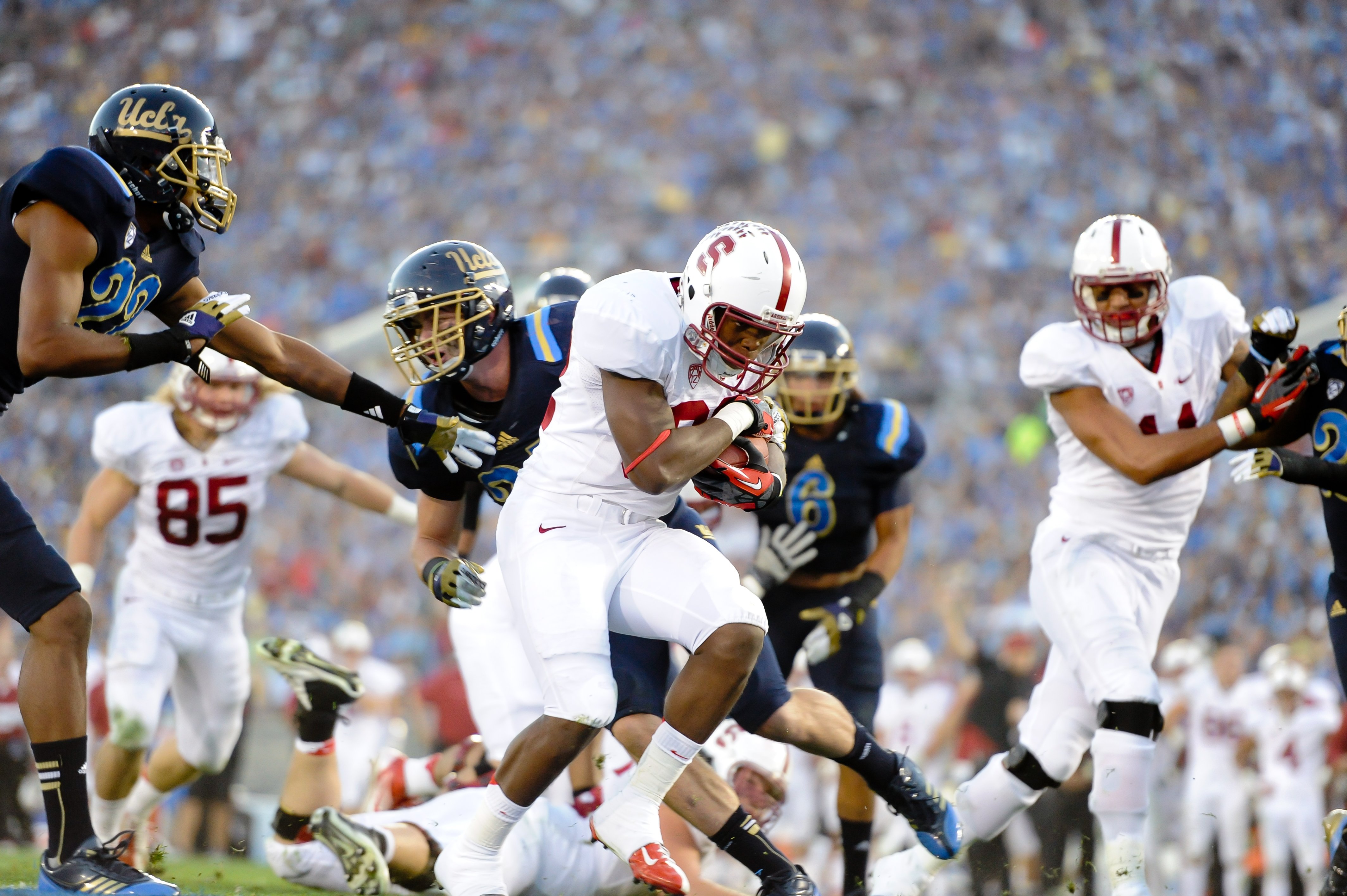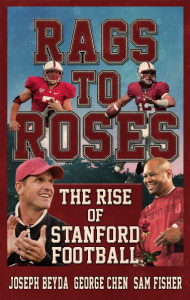Jim Harbaugh wants 50 points. Tyler Gaffney wants his first collegiate touchdown.
USC’s fans want nothing to do with it.
The Coliseum is mostly empty when Gaffney falls into the endzone to make it 54-21 Stanford. But even though there aren’t many people around to watch the freshman’s first score, one man can see the whole thing: the quarterback that handed the ball off to Gaffney, Tavita Pritchard.
A strange set of events led up to the two players’ connection that day in 2009. If Harbaugh hadn’t decided to run up the score on a perennial power, Stanford wouldn’t have been driving down the field; if a redshirt freshman quarterback hadn’t earned the starting job over Pritchard in the preseason, the fifth-year senior wouldn’t have been sent into action in garbage time; if the team’s top two running backs hadn’t already compiled 243 yards on the day, Gaffney probably wouldn’t have been the weapon of choice on the 1-yard line.
But four years after that touchdown, Pritchard and Gaffney are working together once again, and believe it or not, the circumstances are even more unusual this time around.

Pritchard is beginning his first season as the Cardinal’s running backs coach, having spent a year as a volunteer assistant for Stanford and two more as a defensive assistant — needless to say, not a job that many former quarterbacks pursue. He returns to the offensive side of the ball just in time to coach Gaffney, who left the Farm to play pro baseball before last season but has temporarily hung up the batting gloves to come back for his final year of college football eligibility — needless to say, not a career path that many running backs take.
“It’s good to connect with a coach on that kind of level,” Gaffney says of his former teammate, Pritchard. “He knows what we’ve been through.”
It’s crucial that the Cardinal has a running backs coach it can trust in 2013. The position group lost Stepfan Taylor, the leading rusher in school history (4,300 yards), to the NFL this offseason. Replacing his statistical production will be a challenge in and of itself, but the other details that made Taylor such a solid all-around back — chief among them, pass protection — will also need to be hammered out. That’s why Pritchard is a good fit in more ways than one.
“Having a quarterback as a running backs coach is a very big asset,” noted junior tailback Remound Wright, “in terms of picking up blitzes and seeing what’s coming.”
The less experienced running backs will also turn to Gaffney and senior Anthony Wilkerson to learn another intangible: how to succeed in a “running back by committee” system. Gaffney and Wilkerson were part of the Cardinal’s five-man stable of backs that replaced Heisman Trophy runner-up Toby Gerhart in 2010, and head coach David Shaw has indicated that he will use five running backs per game in 2013 as well to fill in for Taylor.

Don’t mistake the multi-back system for a lack of decisiveness by the coaching staff. The team rushed for 213.8 yards per game in 2010 using a running back by committee, good for 17th in the country and down only 4.5 yards per game from the Gerhart-led 2009 offensive production. Spreading the carries around also leaves the Cardinal better prepared for potential injuries.
“It’s not always going to be that Stepfan Taylor stays healthy for four years straight,” Shaw said. “Guys are going to get dinged up for a week or two weeks, and we have guys that will fill in and do very well for us.”
“They’re all tremendous with the ball, and that’s why they’re here,” Pritchard added. “That’s why we’re going to play…all of them. And we told that to them, and they know the options are to be on a good team with a lot of guys that are worthy of playing time, or go somewhere that’s maybe not as good, and you’ll be the guy.”
One running back has been forced to fight a bit harder than expected for that playing time this offseason. Before Gaffney announced his return, Wilkerson was the presumed starter, having backed up Taylor with 231 yards in 11 games last year. So even though he still might have a leg up on Gaffney, who says his body is not “the best [it’s] felt” after a year off from football, Wilkerson will have to compete for carries the same way he did as a freshman.
“I know [Wilkerson] will be prepared,” Pritchard said. “He’s mature, and that comes from having had this experience already.”
Wilkerson sat out Saturday’s open scrimmage with a minor injury, so it still remains to be seen which back will start; Shaw, anyways, deemphasizes which player is listed on game day. Wilkerson had 89 carries to Gaffney’s 60 in 2010, while Gaffney had 74 to Wilkerson’s 56 in 2011, so it’s anybody’s guess who will earn the upper hand this time around after a yearlong break in the competition.
Though Gaffney and Wilkerson should get the bulk of the carries, it’s sophomore Barry J. Sanders, the son of one of the greatest running backs in NFL history, who has garnered much of the national hype. Sports Illustrated even projected that Sanders would top 1,000 all-purpose yards in its college football season preview. If the team’s rotations in the Cardinal & White Spring Game and the open scrimmage are any indication, that won’t be the case.
Around this time last year, Stanford’s coaching staff had to cut off interview access to the then-freshman tailback, who redshirted in 2012. And even though Sanders still receives disproportionate attention for a player that doesn’t have a single collegiate carry, Shaw has noticed that he deals with the expectations well.
“The best thing with him is that he’s lived with it his whole life,” Shaw said. “He’s lived with the comparison; it rolls off of his back. He knows he wants to be his own guy. He wants to wear his own number. He wants to be himself. And he’s as mature and as comfortable as anybody who’s been with a relative of that fame and that success.”
Sanders will join Wright and senior Ricky Seale below Gaffney and Wilkerson on the depth chart. Wright was used primarily as a short-yardage back last year and Sanders is known as a shifty playmaker out in space, but Pritchard says that both are working on their pass protection. On the other hand, Seale is a better blocker and a “tremendous” zone runner, but he has work to do with some of the Cardinal’s other run schemes.
Classifications aside — Wright, for one, was unwilling to break down the backs’ specific strengths — Stanford’s five-headed monster tends to blend into a single identity.
“It’s funny, because all of our guys adopt that physical style,” Pritchard said. “They come in here a power runner or a finesse runner or a space guy, I mean, they all adopt our physical style. And when it comes to getting between the tackles and sticking the ball downhill when we need three, four, five yards, they all do it.”
“We should look relatively the same [as in the past],” Gaffney said, “with a couple different numbers out there.”
Contact Joseph Beyda at jbeyda “at” stanford.edu.
The Daily’s football preview series will be back Wednesday, as we explore the Cardinal’s wide receiver corps. (Note: For the purposes of this series, we are considering WR/RB Kelsey Young a wide receiver.)
Previous installments in our 2013 football season preview:
Aug. 25: Anderson, Stanford defensive line look to wreak havoc once again
Aug. 20: Tarpley, Skov and Murphy headline Stanford’s elite linebacker corps
Aug. 19: Upstart tight ends look to fill void left by Ertz, Toilolo
Aug. 14: Hogan embraces leadership role, ready to take the next step
Aug. 13: Offensive line powers forward, seeks new center
Did you know that Toby Gerhart, another two-sport running back, was nearly forced off the team in 2007 due to his baseball commitments? Read about Gerhart’s intimidating first meeting with new coach Jim Harbaugh in “Rags to Roses,” available in the Amazon Kindle store now! Stanford Daily football beat writers Joseph Beyda, George Chen and Sam Fisher interviewed 30 current and former players and coaches to bring you the story of the Cardinal’s resurgence from 2006 to 2012. You can also check out the free excerpts here.

